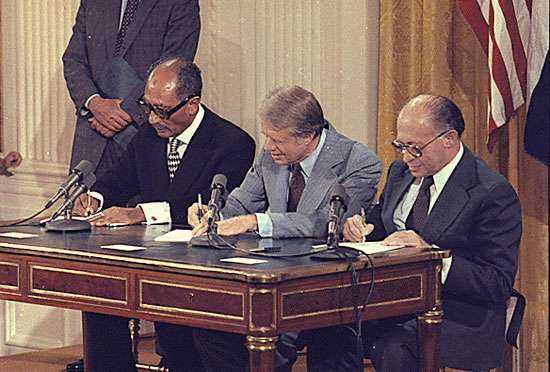Camp David Accords, assertions amongst Israel and Egypt marked on September 17, 1978, that drove in the next year to a peace settlement between those two nations, the main such bargain amongst Israel and any of its Arab neighbors. Handled by U.S. Pres. Jimmy Carter between Israeli Prime Minister Menachem Begin and Egyptian Pres. Anwar el-Sadat and authoritatively titled the "System for Peace in the Middle East," the understandings wound up known as the Camp David Accords on the grounds that the arrangements occurred at the U.S. presidential withdraw at Camp David, Maryland. Sadat and Begin were granted the Nobel Prize for Peace in 1978 for their commitments to the assentions.

A condition of war had existed amongst Egypt and the State of Israel since the foundation of Israel in 1948. In the initial three Arab-Israeli wars, Israel unequivocally crushed Egypt. Because of the 1967 war, Israel possessed Egypt's Sinai Peninsula, the 23,500-square-mile landmass that connections Africa with Asia. At the point when Anwar el-Sadat wound up Egyptian president in 1970, he got himself pioneer of a financially harried country that could sick bear to proceed with its interminable campaign against Israel. He needed to influence peace and accordingly to accomplish security and recuperation of the Sinai, however after Israel's shocking triumph in the 1967 war it was impossible that Israel's tranquility terms would be good to Egypt. So Sadat thought about a challenging arrangement to assault Israel once more, which, regardless of whether unsuccessful, might persuade the Israelis that peace with Egypt was vital.
At that point, on October 6, 1973, Egyptian and Syrian powers propelled a joint assault against Israel. It was Yom Kippur, the holiest day of the year for Jews, and Israeli powers were overwhelmed totally. It took over seven days for Israel to beat back the great Arab progresses. A U.S. carrier of arms supported Israel's motivation, yet President Richard Nixon deferred the crisis military guide for seven days as an implied flag of U.S. sensitivity for Egypt. In November, an Egyptian-Israeli truce was anchored by the United States.
Despite the fact that Egypt had again endured military thrashing against its Jewish neighbor, the underlying Egyptian triumphs extraordinarily improved Sadat's eminence in the Middle East and furnished him with a chance to look for peace. In 1974, the first of two Egyptian-Israeli separation assentions accommodating the arrival of parts of the Sinai to Egypt were marked, and in 1975 Sadat made a trip to the United States to examine his tranquility endeavors and look for American guide and venture.